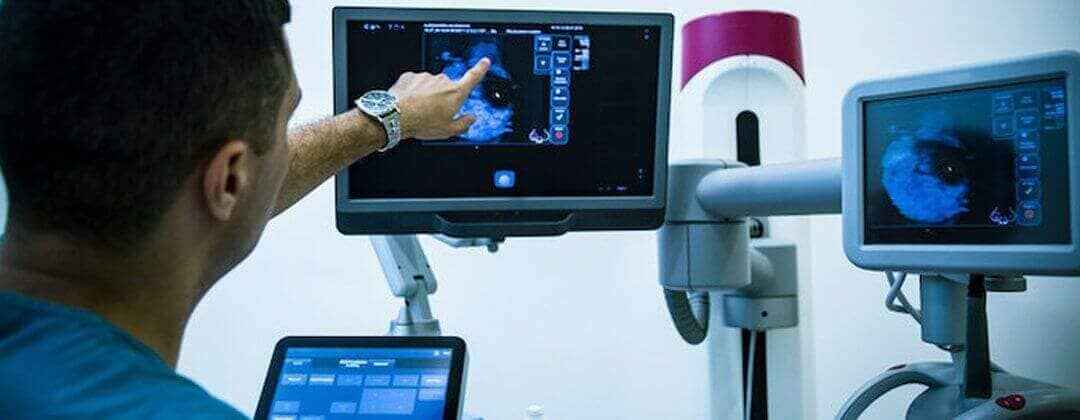Cancer Specialist in Hyderabad
Best Cancer treatement test - Cancer Screening
There are certain tests that can help identify a few types of cancer before any signs & symptoms appear. This is known as cancer screening. Cancer screening tests are designed to find cancers at an early stage where the chances of successful outcomes are the highest.

By recommending cancer screening, doctors aspire to lower the number of cancer cases and to lower or altogether prevent cancer deaths.
Every type of cancer has its own screening test. However, some cancers do not yet have an effective screening method. Here are the most common screening tests used for various types of cancers.
BREAST CANCER:
- Mammography: Mammography is a type of X-Ray that has been specifically designed to identify tutors & irregularities in the breast. The images produced by mammography are known as mammograms.
- Clinical Breast Examination: A medical evaluation of the breast size & shape to look for changes in the breast in terms of lump formation, changes in the nipple, and changes in the texture of skin of the breasts is part of the breast cancer screening.
- Breast Self Examination: Breast self-examination involves women assessing their breasts for changes. If she notices any changes, it is advisable to consult a doctor immediately.
- MRI: MRI is generally not used to screen for breast cancer. But it may be useful for women with high risk or in cases where a lump is found during a breast exam.
CERVICAL CANCER:
- HPV Testing: HPV test is performed on a sample of cells from a woman's vagina or cervix to check for specific strains of HPV. Some strains of HPV are more strongly linked to an increased risk of cervical cancer.
- PAP test: This test also involves the use of cells from the outside of the cervix to check if the cells are cancerous or precancerous. A Pap test is generally done in combination with HPV.
COLORECTAL CANCER:
- Colonoscopy: During this procedure, a colonoscope is inserted into the rectum. The doctor can then look at the entire colon for polyps or cancer.
- Sigmoidoscopy: In this procedure, a sigmoidoscope is used to check the lower colon for cancer or polyps. However, in this test, the upper part of the colon cannot be assessed.
- Fecal Occult Blood Test: This test is done to check for blood in the stool which could be a sign of cancer.
- Stool DNA Tests: This test helps in analyzing the DNA of the stool to identify cancer.
- Double Contrast barium enema: The barium enema used in this X-ray of the colon & rectum helps them stand out in the X-ray. This is generally performed in cases where colonoscopy cannot be done.
PROSTATE CANCER:
- Digital Rectal Examination: In this test, the doctor's surface of the prostate is checked for any irregularities.
- PSA test: This test measures the level of Prostate Specific Antigen Test. It is usually found at higher than normal levels in men with prostate cancer.
LUNG CANCER:
- Low Dose Helical or Spiral CT Scan: CT scan takes the X Rays of the insides of the body from different angles. These images are then combined into a 3-D image which helps identify any abnormalities or tumors.
Recommendations for Screening
Screening recommendation depends on several factors such as:
- The type of cancer to be screened for
- The tests to be used to screen a particular type of cancer
- Age at which screening should begin & end
- The frequency at which screening should be done
What are the risks of screening?
While cancer screening has proven to improve survival rates, there are certain risks associated with it. Some of these include:
- Overdiagnosis: Screening tests may also identify slow-growing cancers which are not likely to harm the patient. As a result, some people may receive potentially harmful, stressful, or painful treatments which are not necessary.
- False Positives: In some cases, although rare, a screening test can suggest that a person has cancer when in fact they do not.
- False Assurance: In other cases, screening tests may suggest that there is no cancer when the patient actually does. As a result, the person remains untreated.
Dr. G Vamshi Krishna Reddy is an experienced & highly skilled medical oncologist who treats patients with the utmost care & compassion. He has successfully treated patients with different types of cancers through a personalized treatment approach.
World Class Expertise
Dedicated to providing you with the top notch, advanced, comprehensive & compassionate cancer care through innovative & advanced treatments.
Contact
Contact Us
